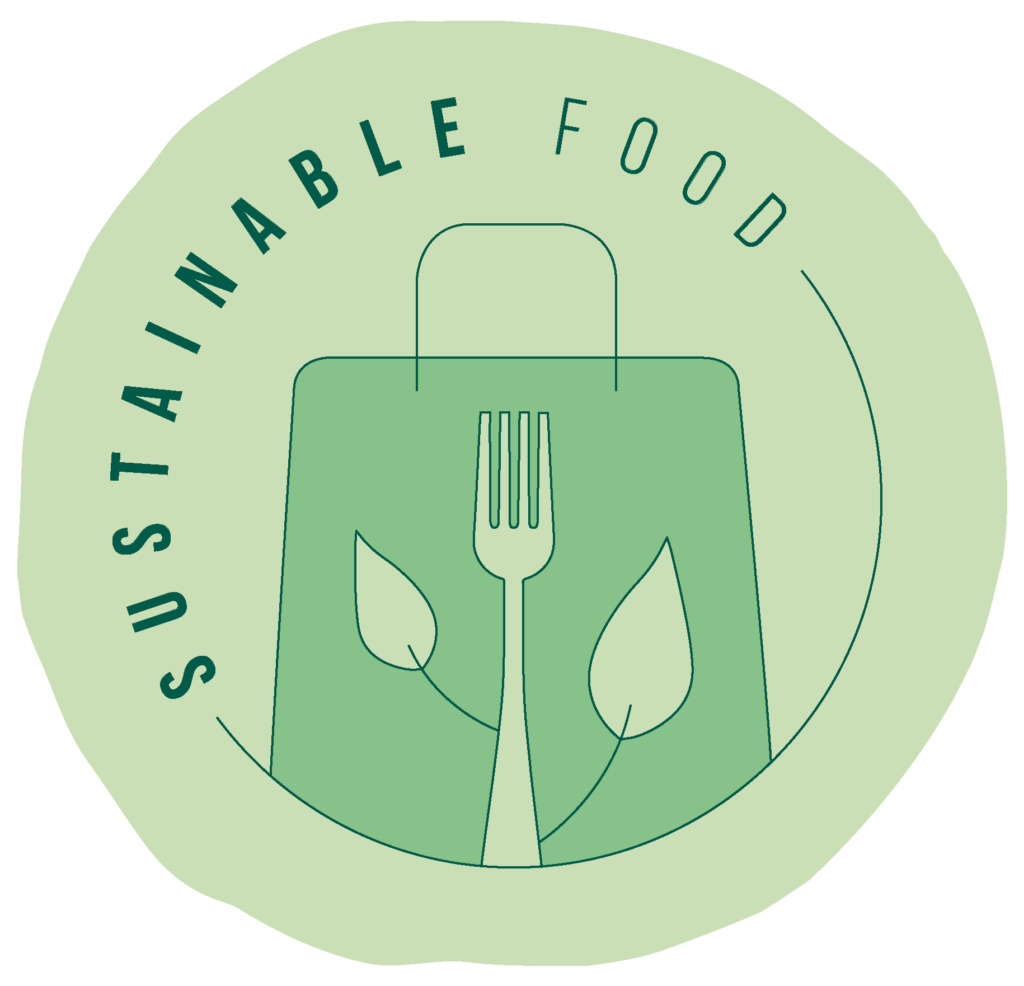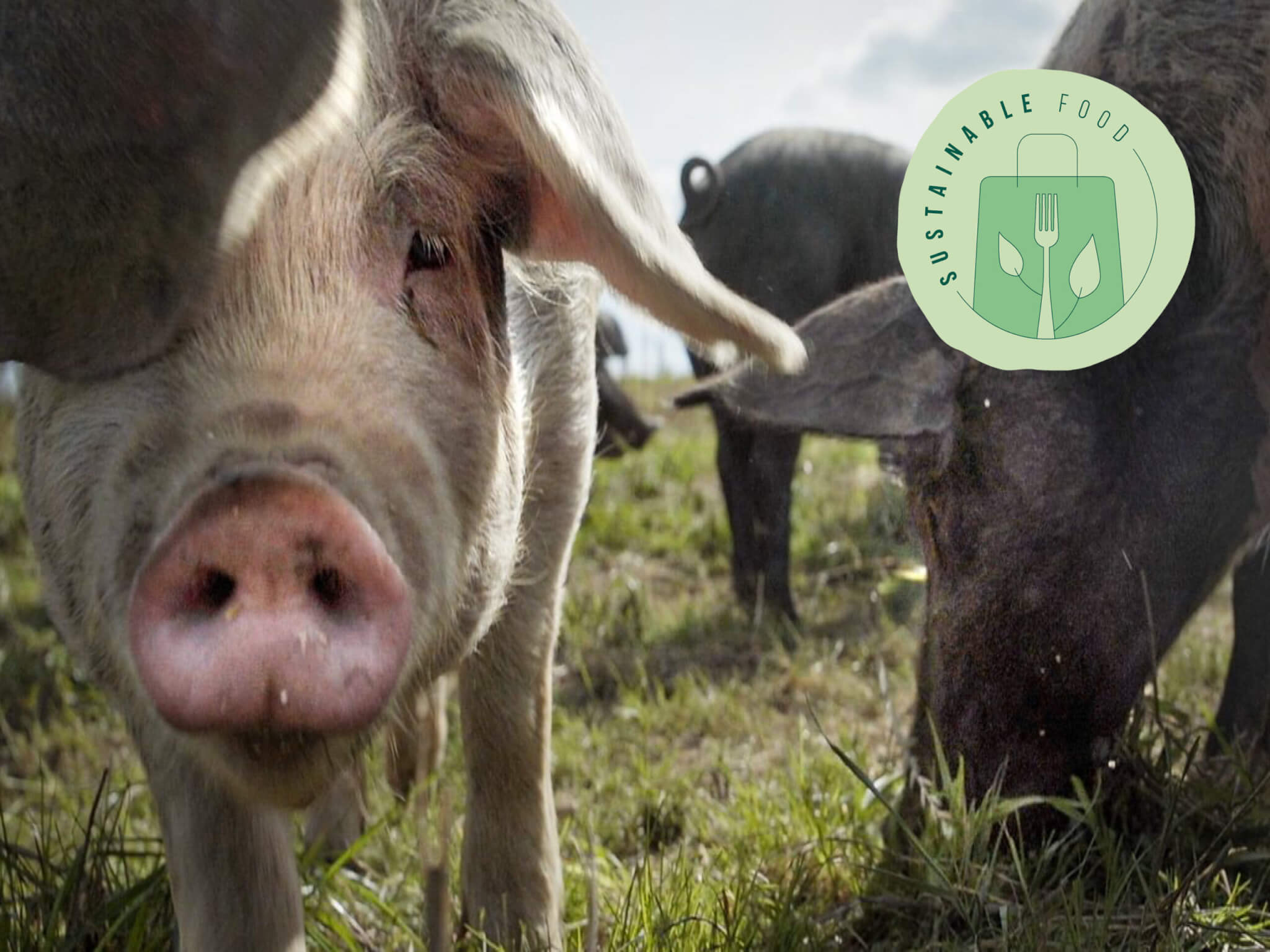
From a bacon butty to a Sunday roast, how are the pigs raised and how do you know how to spot a sustainably sourced sausage?
Labels, or a lack thereof
As explored in previous Wicked Leeks articles here and here, Red Tractor once again has very little meaning when it comes to the welfare of pigs. While it does mean that the pork is from UK pigs, it does also allow pigs to be kept in farrowing crates (small cages to stop them moving away from piglets) for up to 5 weeks after giving birth, and to live on bare floors without bedding. Intensive indoor production also has wider environmental impact, such as the pollution of our rivers.
Farms Not Factories reports that 70 per cent of the pork that is imported (which makes up 53 per cent of our consumption) is from farms where the conditions would be illegal in the UK, including allowing pregnant sows to be kept in sow stalls (which are even smaller than farrowing crates) for up to a month at a time. Buying imported pork that has no high welfare label will likely come from farms that include these practices.
“In factory farms, pigs are cruelly crammed into barren steel pens, and the law requiring that they have straw is widely ignored,” Tracy Worcester from Farms Not Factories points out. “Because of the overcrowding of growing pigs and resulting misery and stress, the pigs get sick and have to be routinely dosed with antibiotics to keep them alive.”
RSPCA Assured covers both indoor and outdoor systems, but for indoor systems it means pigs aren’t kept in crates and have bedding and space in which to nest.
Outdoor reared or outdoor bred?
Unfortunately, there is no legal definition on the use of the term free-range when it comes to pork, so be wary of trusting this label alone.
The term ‘Outdoor Bred’ refers to systems where sows give birth in an outdoor unit, but the piglets are moved indoors after weaning to be fattened. ‘Outdoor Reared’ is one step up, with the pigs living outdoors for at least half of their lives. Under both systems, the sows remain outdoors. With these labels, it is worth looking for more information about the nature of the indoor system used – the RSPCA Assured logo usually means they have more space and bedding than in intensive systems. In September 2024, the BBC reported:
However, in September 2024, the BBC reported that animal welfare activists carried out secret filming on RSPCA Assured farms which they said showed breaches of legal standards and regulations. “These included overcrowding, poor hygiene, unacceptable health conditions and, in extreme cases, physical abuse of livestock by farm workers.”
Organic
Certified organic pork means the sows and the pigs have permanent access to the outdoors for their whole lives (except when weather restricts this), and plenty of bedding in their shelters. They are also not weaned until at least 40 days old, cannot be fed on GM feed, and practices such as teeth cutting and tail docking are banned.
Soil Association Head of Standards Chris Atkinson said: “We believe that farm animals should be kept in conditions that, as far as possible, allow them to express their natural behaviours and give them the best chance of living a good life. For pigs, that means a life outdoors where they can enjoy using their snouts to forage and feel the sun on their backs. Sadly the majority of pigs in the UK are housed for their entire lives, but the opposite is true in organic.”
Pig feed
Pigs are naturally omnivores, making up their diet from forage, roots, nuts and more. In many farming systems, they are usually fed on a mix of feed including grains and protein, the latter usually coming from soya. Organic pigs diet must also include roughage, fodder or silage as part of their daily feed.
With 76 per cent of global soya production going to animal feed, and 28.1 per cent of this being fed to pigs, this is a huge issue, contributing to land grabbing and deforestation across the Amazon and South America.
The Landworkers’ Alliance, Pasture for Life, Sustain and Hodmedods have put together a Pastured Pigs guide, detailing case studies and research on alternative options to encourage farmers to move to a more diverse diet.
Amy Chapple from Redwoods Farm in Devon raises pigs – a mixture of rare breeds – on her family’s 150 acre farm. As well as going soya free in their diet, she mob grazes them through pasture on the farm. “The pasture really supplements their diet, and they still fatten up, even over the winter months,” she explains. The remainder of their diet is made up from barley, wheat, beans, peas and rapeseed meal, and while being soya free was a positive, for her it was more about finding local sources of feed; “It’s not just about being soya free,” she points out; “You need to say what you’re feeding them with instead and not just replace it with something else problematic.”
Historically pigs were often fed on waste food – known as swill – but after this practice led to an outbreak of foot-and-mouth disease, it has been illegal since 2001. Campaign groups such as Feedback have run campaigns to highlight the role this can play in utilising surplus food and to get this practice reintroduced (with safety restrictions to remove the risk of another outbreak), but the ban currently remains in place.
Which breed?
There is a move back to using heritage and rare breeds, with farms, restaurants and customers drawn to the increased flavour of the meat and their resilience to the weather and natural environment. There has been a learning curve though too – many rare breeds produce a fatter pig, and while fatty meat was once sought out, the modern customer often has a leaner palate. For many farmers, this has been a journey of learning about these breeds and adjusting both breed and feed to produce a pig that both works for the land but also the consumer.
Lowering consumption
The current level of consumption of pork in the UK is unsustainable, and the Soy No More report details that we need to reduce our overall pork consumption by 82 per cent if we are to halt pork imports and stop importing soya for feed. The Sustainable Food Trust estimate a 76 per cent reduction is necessary to move to a sustainable UK based diet, mostly as a result of moving to a less intensive free-range system and needing to produce less cereal for animal feed (currently around half of UK grown cereals are for animal feed).
Another aspect of our consumption to consider is the vulnerability of industrial pork production to labour changes. Shortages to skilled labour as a result of Covid and Brexit meant that thousands of pigs had to be culled as farms running on rigid schedules and maximum capacity meant that they were unable to absorb delays within the processing industry.
Where to buy?
If buying from a supermarket, pay careful and close attention to labels and look for organic where possible. Farmers Markets or independent retailers offer a better option (though always check the provenance) and many farms now offer boxes by post.
Farms Not Factories have put together a directory of high welfare farms, restaurants and retailers around the UK. Whilst not an exhaustive list, it is a good place to start.
“If we want to avoid buying meat from pigs that have suffered in factory farms, it is time we took back control of our food economy by buying directly from farmers,” Tracy Worcester explains. “Buying organic or free range pork direct from farmers might be more expensive but this is only because the farmer has been paid fairly and because, unlike factory farms where the external costs of cruelty, pollution and antibiotic overuse are not reflected in the price, all the external costs of producing healthy happy animals is internalised into the price of the product.”
This feature is part of our new WL Sustainable Food Series, by Steph Wetherell, which includes guides on fruit, veg, bread, grains, and much more, over the coming weeks.










Ever since getting slight gout following tendonitis caused by lockdown walking, I’ve been pork sensitive. I’ve noticed that the poorer quality the pork eg if I succumb to that bacon butty, hot pork roll [yes we live in the north now, they don’t exist down south] or fry-up out and about, the more sore my foot will be. Riverford sausages or occasional pork joint don’t seem to do as much harm. Interesting!
Having just watched the film/documentary The End of Medicine. this article is and it’s contents very much on my mind.
Pigs, like many other animals, are being kept in such crowded conditions that they are routinely given antibiotics to keep them alive long enough to grow to a size when we can kill them ( sounds ridiculous as I type the words ) And at the same time the very antibiotics used are getting less effective as the microbes get resistant to them.
Yet we carry on without giving heed to any of this. Growing acres and acres of feed to feed to animals, yet producing less calories than if we fed the grain directly to people.
I’ve worked on a small farm. Pigs are furless dogs from my observation. They like to play together and with toys; they kiss you to say thanks; they’re emotional and curious. We have to change the way these fully sentient beings are slaughtered. They are dangled by their back leg and sprayed with boiling water to loosen their skin before their throats are cut and they’re left to bleed out. They’re not even stunned. Until this changes, I continue to avoid even the most “humane”-labeled product.
I worked on a farm that had pigs too and I learned that pigs have personalities and are in many ways just like us (and dogs)!! Yes, we humans need to be conscious of our buying patterns. The more we choose what we buy and how it’s sourced and eat just a small amount of animals that are ethically reared and sourced, the better. Its time to stop focussing on ‘cheap’ and go for quality instead. Also…….
There is a way that organisations and businesses are independently verified to meet high standards of social and environmental performance, transparency, and accountability. They are called B Corporations. Maybe we can use/create a similar system for our farms.